

Theweek.co. Our British democracy is a presidential system - minus the President. The intense frenzy that has engulfed David Cameron in recent days is nothing new.
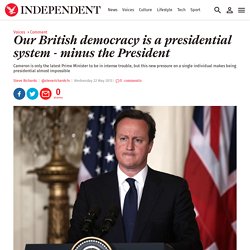
Most of the elements would be familiar to all recent Prime Ministers. Read the vivid diaries of Alastair Campbell and they take you back to the crazy days when Tony Blair seemed to leap from one nerve-shredding crisis to the next, the media speculating whether Blair would survive the week. Go back to the Prime Minister before Blair and recall that John Major was on the edge of a cliff for most of the time. Go further back and even the deified Margaret Thatcher lurched from one seemingly terminal emergency to another for much of her reign.
Move on from Blair, and Gordon Brown was in a permanent crisis. There are specific and substantial reasons for this in each case. But he is a talented politician and an intelligent student of politics. MYTUTORWEB.CO.UK Summary Answer. General Election 2010: Is David Cameron trying to be the British Barack Obama? “But I think he’s making a mistake by copying phrases from US presidents.
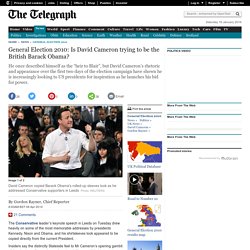
It seems as though he is trying to get the reflected glory of some of those great speeches, but what he should be doing is coming up with his own phrases.” Mr Cameron’s speech in Leeds on Tuesday, delivered from memory, repeatedly used the words “change” and “hope”, giving it the feel of an Obama campaign speech, and the Tory leader paraphrased President Kennedy’s inaugural address of 1961, saying: “Ask not what your government can do for you. Ask what we can do to make our country better.” But the pivotal soundbite of Mr Cameron’s speech, his claim that he was fighting for “the great ignored” of middle-England taxpayers, was inspired by the less likely figure of President Nixon, who memorably appealed to “the great silent majority” of Americans as he asked for their support for his plan of action to end the Vietnam war in 1969.
The Obama influence was greatest in Mr Cameron’s appearance on Tuesday. What is Cameron's leadership style? Presidential? Political scientists have endlessly debated the power of the prime minister and have never really been able to settle that hoary old question.
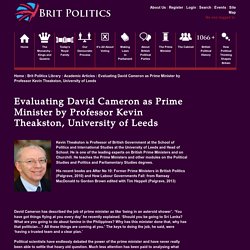
Much less attention has been paid to analysing what prime ministers have to do, how they do it, and how well they do it – how effective they are as political and government leaders. Borrowing from American presidential studies, the focus here is on Cameron’s political skills and leadership style, using a six-point model derived from Fred Greenstein’s study of US presidents (The Presidential Difference, 2001), adapted to the institutional and political context of the British system.
The argument, briefly, is that prime ministers have to: communicate – organize – show political skill – set out policy aims and visions – process advice and take decisions – cope with the stress of the top job and show emotional intelligence. David Cameron, Mr President? This article is from the May 2013 issue of Total Politics The Conservatives Party’s 2010 general election campaign put David Cameron up front, even if he was a bit too air-brushed.
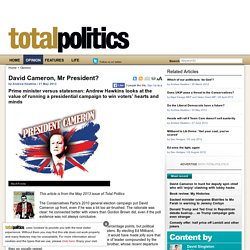
The rationale was clear: he connected better with voters than Gordon Brown did, even if the poll evidence was not always conclusive. Ditching Brown gave Labour a popularity boost of around four percentage points, but political parties rarely think strategically when choosing replacement leaders. By electing Ed Miliband, Labour had clearly not learnt from the post-Blair experience, or it would have made jolly sure that David had won. They are now saddled with a sub-optimal choice of leader compounded by the widespread view – still – that he nicked the leadership from his brother, whose recent departure they so vocally regret. Fast-forward to today, and the ‘presidential factor’ – Cameron versus Miliband – is central to the Conservatives’ 2015 election hopes. Why is this important? Concluding remarks from a review of Foley's Book 'The British Presidency'
The Blair Factor (this is a good source to start with, lots of examples!) The Rubber Band of Parliament. Key Facts about Presidentialism. President Thatcher? The Growth of the 'Inner Cabinet' The Origins of Presidentialism in the UK. Of prime ministers and presidents: Thatcher's forgotten legacy. By Tony Hudson It all started with Maggie.
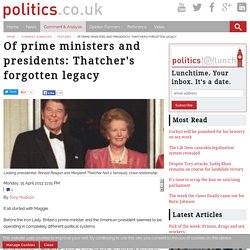
Before the Iron Lady, Britain's prime minister and the American president seemed to be operating in completely different political systems. Summary: Richard Heffernan Parliamentary Affais. Tony blair article 1/2. Tony blair article 2/2. David cameron and coalition. David cameron coalition II. The British prime minister has become more prime ministerial and less like a president – Ballots & Bullets. The July issue of Parliamentary Affairs is now online and this issue’s Editor’s Choice is The Prime Ministerialisation of the British Prime Minister by Keith Dowding.

The full article is free to download from the Oxford Journals website. For forty years or more commentators have suggested that the British prime minister is becoming presidential. Whilst the recent coalition government has given some pause to that claim it shows little sign of permanently abating. There are two issues here.